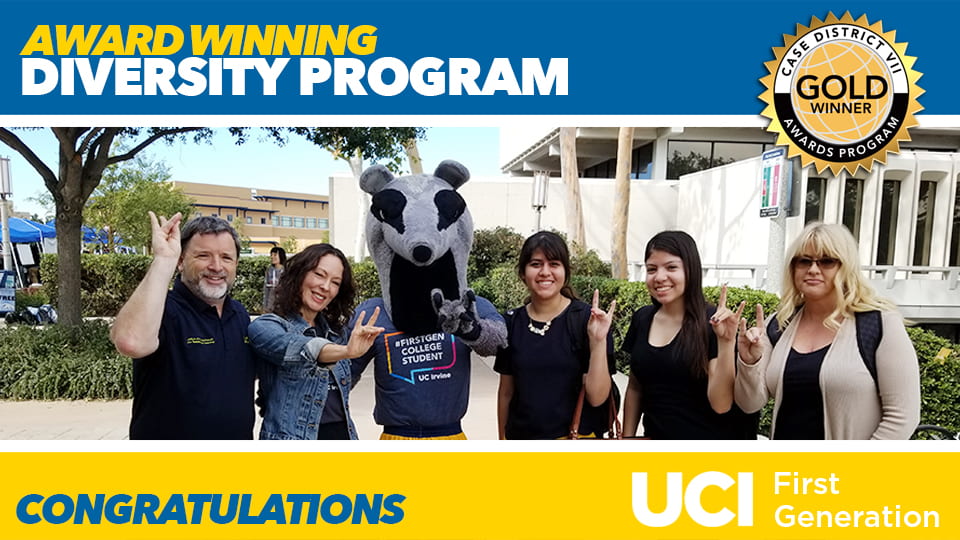
College can be a stressful, intimidating place, especially for students whose own parents didn’t go to college.
In January 2019, UCI News published a press release stating that “UCI was the top choice for first-generation students and those from low-income families and underrepresented groups.”
One way UCI encourages the success of the first generation students who make up more than half of UCI’s total student population is through the efforts of the First Generation Faculty (FGF) Initiative, a coalition of faculty formed in 2014 by UCI’s Department of Undergraduate Education (DUE). The FGF Initiative has been so successful in its efforts that the Council for Advancement and Support of Education (CASE) District VII has awarded Michael Dennin, UCI’s Vice Provost for Teaching and Learning and Dean of Undergraduate Education, the Gold Award for Diversity, first place in its category. The award will be presented in February at the CASE Conference in Anaheim.
The FGF Initiative was created and first led by Anita Casavantes Bradford, Associate Professor of Chicano/Latino Studies, and is currently run by Pavan Kadandale, Associate Teaching Professor in Molecular Biology & Biochemistry, in collaboration with Kevin Huie, Director of Student Success Initiatives, and his staff.
According to the FGF Initiative website, FGF’s goals are to “foster a campus climate that welcomes first generation students, acknowledges and works to overcome the challenges they face in their pursuit of academic success and wellbeing, and celebrates their work ethic, perseverance, and accomplishments.”
Members of the FGF Initiative aspire to be relatable role models whom first generation students can comfortably seek out for advice. The FGF Initiative encourages instructors, students, and staff on campus to identify themselves as the first in their families to attend college via t-shirts and buttons.

In addition to visibly identifying themselves to students, faculty have shared their stories and experiences in order to help students have an easier time relating to them.
“We believe that UCI’s first generation students represent the best and brightest on our campus,” said Casavantes Bradford. “They are courageous, ambitious, adaptable, and resilient. Our campus first generation program aims not only to provide those students with support when needed, but equally importantly, to make them feel welcomed and to celebrate the multiple strengths they bring to the table.”
The FGF Initiative holds workshops twice a year, in the fall and spring quarters. According to the website, the workshops “feature short lectures and presentations by scholars/experts on topics of importance to first-generation students; information sessions led by representatives of campus Student Support Service offices/organizations; or other relevant training sessions on how to best advocate for first-generation students. Meetings also provide faculty members with opportunities for discussion and networking.”
Dean Dennin has contributed to the FGF Initiative by starting an annual #UCIFirstGen walk around campus to raise awareness about supporting First Gen students.

He also started a pilot program that featured workshops and FGF promotional merchandise, and has used his social media influence to heighten the FGF Initiative’s visibility. These actions also mirror UCI’s involvement in the American Talent Initiative, which highlights efforts to support underserved student communities.
“With such a big first generation presence on campus,” said Dennin, “I felt like the FGF Initiative was something that would be transformative for UCI.”
And it has been, but not just for UCI alone. All University of California campuses now have their own FGF Initiatives as a direct result of the success of UCI’s FGF Initiative.
Janet Napolitano, President of the University of California system, told Inside Higher Ed that “UC aims to connect first-generation students with the tools necessary for academic success, to foster a sense of belonging and ownership among this critical student population, and to ensure that UC continues to serve as an engine of economic mobility for our diverse population of undergraduates.”

